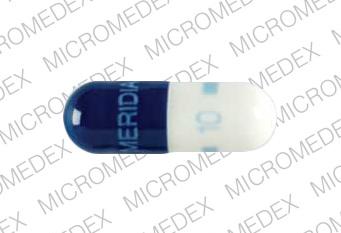Meridia Disease Interactions
There are 7 disease interactions with Meridia (sibutramine).
Sibutramine (applies to Meridia) anorexia nervosa
Major Potential Hazard, High plausibility.
The use of sibutramine is contraindicated in patients with anorexia nervosa. Sibutramine is an anorexiant used in the treatment of obesity.
References
- (2001) "Product Information. Meridia (sibutramine)." Knoll Pharmaceutical Company
Sibutramine (applies to Meridia) cardiovascular
Major Potential Hazard, High plausibility. Applicable conditions: Cerebral Vascular Disorder, History - Myocardial Infarction, History - Cerebrovascular Disease, History - Thrombotic/Thromboembolic Disorder, Cardiovascular Disease
Sibutramine and its metabolites inhibit the reuptake of norepinephrine, serotonin, and dopamine and can induce substantial increases in heart rate and blood pressure in some patients. Sibutramine therapy should not be initiated in patients with uncontrolled or poorly controlled hypertension and/or a history of coronary artery disease, arrhythmias, congestive heart failure, stroke, or other severe cardiovascular or cerebrovascular disorders. All patients treated with sibutramine should have blood pressure and pulse measured prior to starting therapy and monitored at regular intervals thereafter. Sustained increases in blood pressure or pulse rate may require a dosage reduction or drug discontinuation.
References
- (2001) "Product Information. Meridia (sibutramine)." Knoll Pharmaceutical Company
Sibutramine (applies to Meridia) glaucoma
Major Potential Hazard, High plausibility. Applicable conditions: Glaucoma (Narrow Angle)
Sibutramine and its metabolites inhibit the reuptake of norepinephrine, serotonin, and dopamine and can induce mydriasis. In patients with narrow angles, pupillary dilation can provoke an acute attack of angle-closure glaucoma. Therapy with sibutramine should be administered cautiously in patients with narrow-angle glaucoma or anatomically narrow angles.
References
- (2001) "Product Information. Meridia (sibutramine)." Knoll Pharmaceutical Company
Sibutramine (applies to Meridia) renal/liver disease
Major Potential Hazard, High plausibility. Applicable conditions: Renal Dysfunction
Sibutramine is converted by the liver to two active metabolites, which are further metabolized to inactive substances and subsequently eliminated by the kidney. Due to a lack of clinical data, the manufacturer does not recommend the use of sibutramine in patients with severe renal and/or hepatic impairment. Based on limited pharmacokinetic data, sibutramine may be administered in mild or moderate hepatic insufficiency at normally recommended dosages.
References
- (2001) "Product Information. Meridia (sibutramine)." Knoll Pharmaceutical Company
Obesity drugs (applies to Meridia) diabetics
Moderate Potential Hazard, Moderate plausibility. Applicable conditions: Diabetes Type 2
Obese, type 2 diabetic patients who achieve weight loss may demonstrate improved metabolic control of their disease as a result of their reduced weight. Therefore, patients with type 2 diabetes mellitus should be monitored during weight-reduction therapy (or therapy that may be expected to induce significant weight loss as a secondary effect) for hypoglycemia and reduced need for oral hypoglycemic medication or insulin, and the dosages of these agents adjusted accordingly. Patients should be apprised of the risk of hypoglycemia and be alert to potential signs and symptoms such as headache, dizziness, drowsiness, nervousness, confusion, tremor, hunger, weakness, perspiration, and palpitation.
References
- (2001) "Product Information. Meridia (sibutramine)." Knoll Pharmaceutical Company
- (2001) "Product Information. Xenical (orlistat)." Roche Laboratories
- (2001) "Product Information. Dexedrine (dextroamphetamine)." SmithKline Beecham
- (2001) "Product Information. Didrex (benzphetamine)." Pharmacia and Upjohn
- (2001) "Product Information. Prelu-2 (phendimetrazine)." Boehringer-Ingelheim
- (2001) "Product Information. Tenuate (diethylpropion)." Aventis Pharmaceuticals
- (2001) "Product Information. Sanorex (mazindol)." Novartis Pharmaceuticals
- (2023) "Product Information. Qsymia (phentermine-topiramate)." Vivus Inc, SUPPL-23
- (2019) "Product Information. Phentermine Hydrochloride (phentermine)." Tagi Pharma Inc
Sibutramine (applies to Meridia) seizures
Moderate Potential Hazard, Moderate plausibility.
Sibutramine and its metabolites inhibit the reuptake of norepinephrine, serotonin, and dopamine. In clinical trials, seizures were reported in < 0.1% of patients treated with sibutramine. Therapy with sibutramine should be administered cautiously in patients with or predisposed to seizures.
References
- (2001) "Product Information. Meridia (sibutramine)." Knoll Pharmaceutical Company
Sibutramine (applies to Meridia) substance abuse
Moderate Potential Hazard, Moderate plausibility. Applicable conditions: Drug Abuse/Dependence, Alcoholism
Centrally-acting anorexiants are generally subject to habituation and abuse. While sibutramine does not appear to have a significant potential for abuse, clinical data are limited. Therapy with sibutramine should be administered cautiously in patients with a history of alcohol or substance abuse. Such patients should be observed carefully during therapy for signs of misuse of sibutramine.
References
- (2001) "Product Information. Meridia (sibutramine)." Knoll Pharmaceutical Company
Meridia drug interactions
There are 573 drug interactions with Meridia (sibutramine).
Meridia alcohol/food interactions
There is 1 alcohol/food interaction with Meridia (sibutramine).
More about Meridia (sibutramine)
- Meridia consumer information
- Check interactions
- Compare alternatives
- Reviews (70)
- Drug images
- Side effects
- Dosage information
- During pregnancy
- Drug class: anorexiants
- Breastfeeding
Related treatment guides
Drug Interaction Classification
| Highly clinically significant. Avoid combinations; the risk of the interaction outweighs the benefit. | |
| Moderately clinically significant. Usually avoid combinations; use it only under special circumstances. | |
| Minimally clinically significant. Minimize risk; assess risk and consider an alternative drug, take steps to circumvent the interaction risk and/or institute a monitoring plan. | |
| No interaction information available. |
Further information
Always consult your healthcare provider to ensure the information displayed on this page applies to your personal circumstances.


